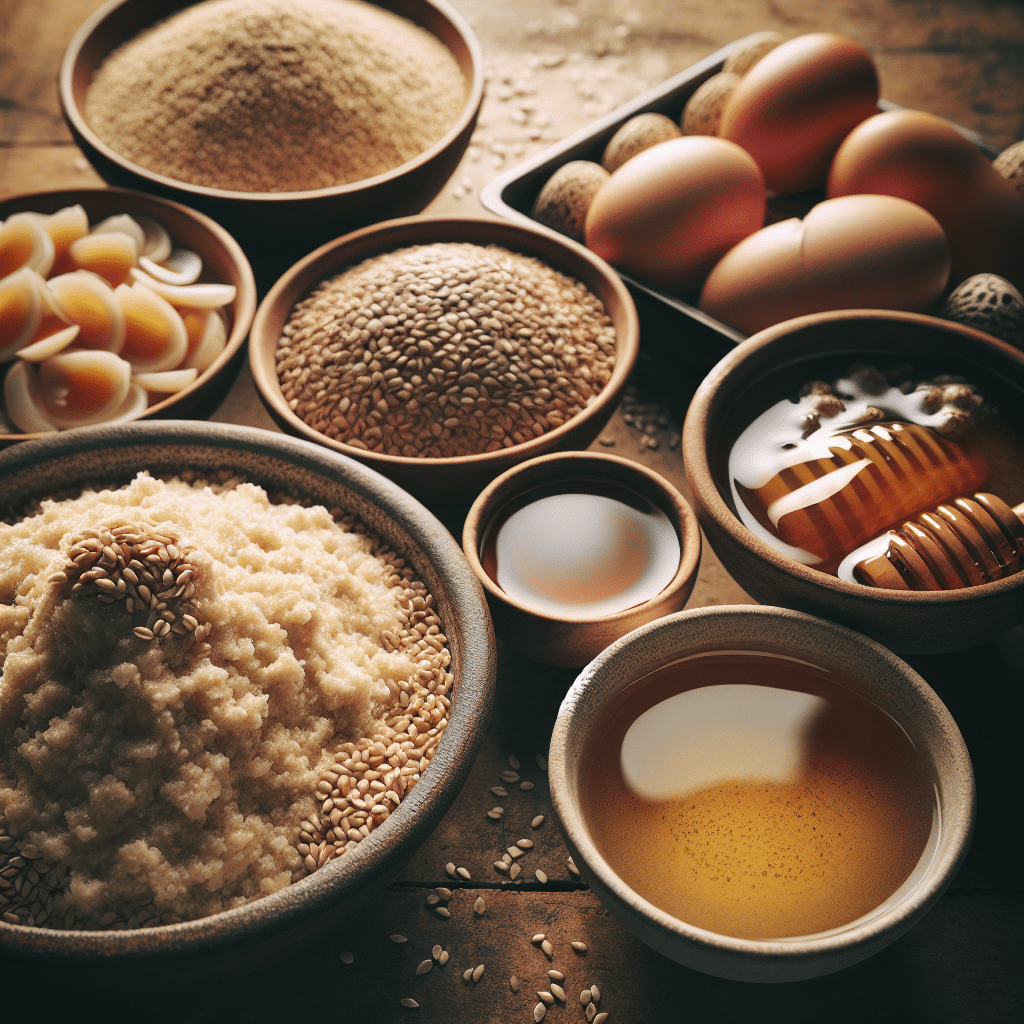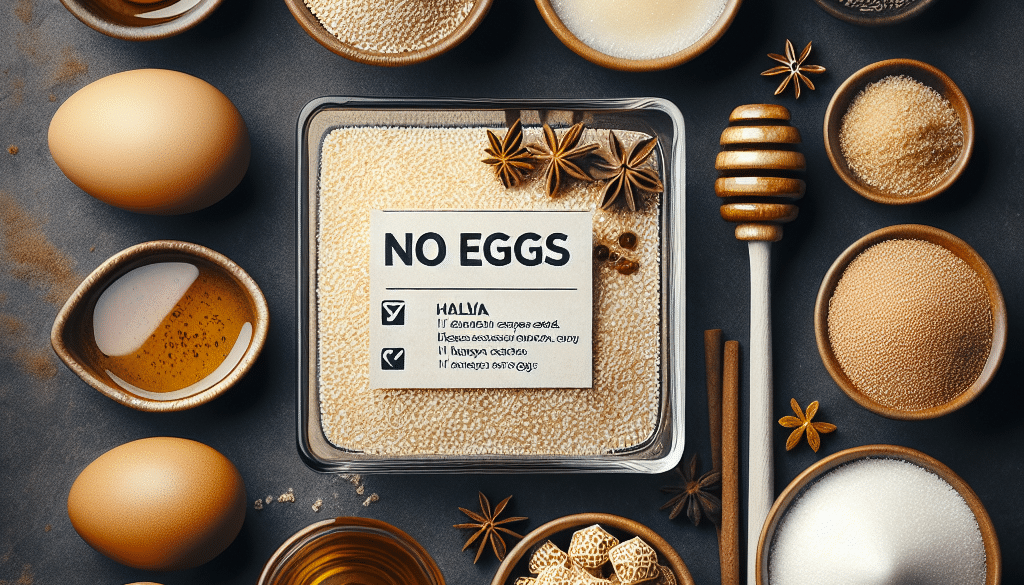Does Halva Contain Egg?
-
Table of Contents
Halva and Egg Content: A Comprehensive Guide

Halva, a dense, sweet confection with roots in the Middle East, has been savored across the globe for centuries. Its popularity has spread far and wide, with various regions adopting their unique recipes and ingredients. A common question among consumers with dietary restrictions or allergies is whether halva contains egg, an important consideration for vegans, vegetarians, or those with egg allergies. This article delves into the composition of halva and addresses the concern regarding the presence of egg in this traditional treat.
Understanding Halva: Ingredients and Varieties
Halva (also spelled halvah, halwa, and other variations) is a term used for various local confection recipes across the Middle East, Central Asia, South Asia, the Balkans, and the Jewish diaspora. The primary ingredients typically include some type of nut butter or flour and a sweetener like honey, sugar, or syrup. The most common types of halva are:
- Sesame Halva: Made from sesame paste (tahini) and sweetened with sugar or honey. It often includes additional flavors such as vanilla or chocolate and may contain nuts or dried fruit.
- Flour-based Halva: Made from grain flour, typically semolina, and sweetened with sugar syrup. It is often spiced with cardamom or saffron and enriched with nuts like almonds or pistachios.
Given the variety of halva recipes, the ingredients can vary significantly from one region to another, which is why it’s essential to examine each type to determine whether it contains egg.
Does Halva Contain Egg?
Most traditional halva recipes do not include egg as a standard ingredient. Sesame halva, for instance, is typically made from tahini and sugar or honey, without the need for any egg. Similarly, flour-based halva usually relies on the properties of flour and sugar syrup to achieve its texture and does not require egg as a binding agent.
However, there are exceptions. Some modern variations or specific regional recipes may incorporate egg to alter the texture or add richness to the confection. For example, certain homemade or artisanal halvas might use egg whites to create a lighter, more airy texture. It is less common in commercial varieties, which tend to adhere to traditional, egg-free recipes for broader appeal.
To ensure that a particular halva is egg-free, it is crucial to:
- Read the ingredient label carefully if purchasing pre-packaged halva.
- Ask the vendor or manufacturer directly about their recipe and preparation process.
- For homemade halva, follow a recipe that specifically excludes egg.
Case Studies and Examples
Let’s consider a few examples to illustrate the variability in halva recipes:
- In Turkey, the traditional sesame halva, known as ‘Tahin Helvası,’ is made without eggs and is enjoyed by people with various dietary preferences.
- In India, ‘Sooji Halwa,’ made from semolina, is typically egg-free but may sometimes include clarified butter (ghee), making it unsuitable for vegans.
- In Jewish cuisine, halva is often made without any animal products, aligning with kosher dietary laws that prohibit mixing meat and dairy, and by extension, making it egg-free as well.
These examples demonstrate that while traditional halva recipes are generally egg-free, regional variations and personal preferences can lead to the inclusion of eggs in some cases.
Health Considerations and Dietary Restrictions
For individuals with egg allergies or those following a vegan diet, the absence of egg in halva is a significant factor. Egg allergies are one of the most common food allergies, especially in children, and avoiding all forms of egg is crucial for those affected. Vegans also avoid eggs for ethical reasons, as part of their commitment to not consuming animal products.
It’s worth noting that while halva may be egg-free, it is not always vegan or suitable for those with other dietary restrictions. Some halva recipes may include honey, which is not vegan, or dairy products, which are unsuitable for those with lactose intolerance or a dairy allergy. As always, checking the ingredients or inquiring about the recipe is the best course of action.
Conclusion: Navigating Halva’s Egg Content
In conclusion, traditional halva is typically made without eggs, making it a suitable option for those with egg allergies or dietary preferences that exclude eggs. However, due to the diversity of recipes and regional variations, it is always advisable to verify the ingredients of any specific halva product or recipe. By doing so, consumers can enjoy this delicious confection while adhering to their dietary needs and preferences.
Discover ETprotein’s Egg-Free Protein Alternatives
If you’re looking for high-quality, egg-free protein sources, ETprotein offers a range of organic bulk vegan proteins that cater to various dietary requirements. Their products are non-GMO, allergen-free, and feature a neutral taste, making them an excellent addition to any diet. Whether you’re formulating sports nutrition, weight management products, or simply seeking to enrich your diet with plant-based proteins, ETprotein has you covered.
About ETprotein:
ETprotein, a reputable protein and L-(+)-Ergothioneine (EGT) Chinese factory manufacturer and supplier, is renowned for producing, stocking, exporting, and delivering the highest quality organic bulk vegan proteins and L-(+)-Ergothioneine. They include Organic rice protein, clear rice protein, pea protein, clear pea protein, watermelon seed protein, pumpkin seed protein, sunflower seed protein, mung bean protein, peanut protein, and L-(+)-Ergothioneine EGT Pharmaceutical grade, L-(+)-Ergothioneine EGT food grade, L-(+)-Ergothioneine EGT cosmetic grade, L-(+)-Ergothioneine EGT reference grade and L-(+)-Ergothioneine EGT standard. Their offerings, characterized by a neutral taste, non-GMO, allergen-free attributes, with L-(+)-Ergothioneine purity over 98%, 99%, cater to a diverse range of industries. They serve nutraceutical, pharmaceutical, cosmeceutical, veterinary, as well as food and beverage finished product distributors, traders, and manufacturers across Europe, USA, Canada, Australia, Thailand, Japan, Korea, Brazil, and Chile, among others.
ETprotein specialization includes exporting and delivering tailor-made protein powder and finished nutritional supplements. Their extensive product range covers sectors like Food and Beverage, Sports Nutrition, Weight Management, Dietary Supplements, Health and Wellness Products, and Infant Formula, ensuring comprehensive solutions to meet all your protein needs.
As a trusted company by leading global food and beverage brands and Fortune 500 companies, ETprotein reinforces China’s reputation in the global arena. For more information or to sample their products, please contact them and email sales(at)ETprotein.com today.












